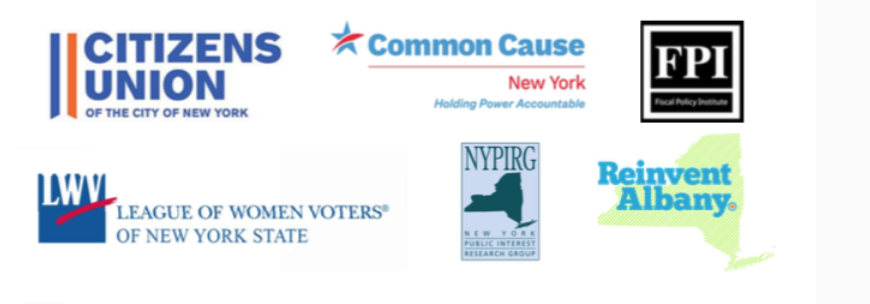Watchdog Groups Urge Governor to Sign Bill Giving State Comptroller Power to Audit Non-Profits Controlled by Local Governments
Memorandum of Support
S.5445 (Skoufis)/A.7476 (Magnarelli)
Title
Relates to audits by the state comptroller of certain organizations directly or indirectly controlled by municipal corporations and certain other government entities.
Summary
Section 1 of this bill amends section 34 of the General Municipal Law to expand the powers of the state comptroller so that the office may audit all private organizations controlled by municipal corporations, industrial development agencies (IDAs), districts, fire companies and agencies. Municipal corporations, IDAs, districts, fire companies and agencies will be considered to control private organizations when one or more of their employees or officers:
1) chooses the organization’s chief executive officer or selects a majority of the highest policy-making body of the organization;
2) constitutes a majority of the voting strength of the members that select the chief executive officer or the majority of the highest policy-making body of the organization
or
1) serves as the majority of the organization’s highest policy-making body;
2) serves in their official capacity as the chief executive officer; or
3) serves in their official capacity as a partner in the organization.
The state comptroller may also audit any private organizations controlled by organizations that meet the above criteria.
Section 2 of the bill allows the comptroller, during examinations involving such organizations, to administer oaths for testimony and compel the appearance and attendance of any person as part of an examination, investigation, or the production of books and papers. The person compelled to appear or be examined shall do so in the county of the principal headquarters of the controlled organization.
Section 3 of the bill clarifies that a majority of the highest policy-making body of the organization includes a quorum of the body if a quorum of the members can take action according to the by-laws of the organization.
Statement of Support
Our groups believe oversight of government agencies by state and local comptrollers is an important tool to ensure that taxpayer funds are efficiently and appropriately spent, and that ethics laws are followed. This bill will extend comptroller oversight to opaque local private organizations, also known as government-affiliated nonprofits, which are in need of much greater scrutiny. We strongly support this legislation, and urge Governor Cuomo to sign it.
We are troubled by the proliferation of government-affiliated nonprofits in New York State and its many localities, a growing shadow government that we believe is less transparent and accountable than government agencies. The local government-affiliated nonprofits that give out business subsidies for economic development are called Local Development Corporations (LDCs) by the New York State Authorities Budget Office (ABO). There are at least 295 LDCs across the state, an increase of 200 percent since 2000. In 2017 alone, LDCs issued $20.3 billion in debt. Both New York City and Westchester County each have 19 LDCs and an Industrial Development Agency (IDA), while Erie County has 17 LDCs, and Suffolk County 16. Other local government-affiliated nonprofits, including more than a hundred in New York City, are largely replicating services that we believe can and should be done by city agencies.
These local government-affiliated nonprofits, whether doing economic development or replicating agency services, do not adhere to the same standards as government agencies for procurement and ethics, and dispute that they are subject to the Freedom of Information and Open Meetings Laws. Consequently, we believe they are at greater risk for corruption and wasteful spending, as does the ABO, which stated in 2017, “the proliferation of LDCs in recent years has increased the risk for waste and abuse of public funds.”
The ABO sued the Orange County Partnership after the latter refused to produce required business records or acknowledge that it was subject to oversight by the ABO. Rather than disband and reform, the Partnership has sought to reconstitute itself to avoid transparency laws that the ABO enforces.
Certain members of the state’s largest LDC, the New York City Economic Development Corporation, claim they are exempt from New York City’s ethics laws. Press reports document one board member making a financial investment in and serving on the board of Hornblower, the ferry operator contracting with EDC, after he came on to the EDC Board.
These are but two examples that demonstrate the need for this legislation, which passed unanimously in the Assembly and with just 2 dissenting votes in the Senate. We urge Governor Cuomo to sign the bill into law.

